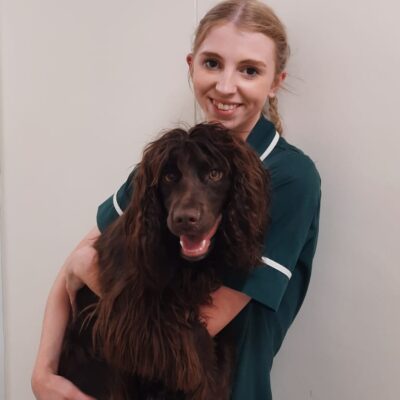Emergency? Call 01228 521 393
Firework Phobia
Fireworks Phobia:
Prescription drugs are often necessary to treat canine firework phobias. Please make an appointment to see a vet who will be able to discuss your dog’s phobia with you.
The information on this page explains measures that can be helpful to reduce anxiety levels in dogs that fear fireworks. The information on this page is also available on our website.
Creating a Refuge
Your dog may already have a preferred place in which to hide. If not, the most suitable place to create a refuge is likely to be in the middle of your house where the fireworks will not be as loud. Put down lots of blankets for your dog to dig amongst. Include an old, unwashed item of clothing as your dog may find your scent comforting. Try to minimise the amount of noise that can enter the shelter using heavy curtains. Ideally the refuge should have no windows so your dog cannot see the flashes from fireworks. The shelter should always be accessible to your dog and the door should be fixed open so that he can’t be locked in or out.
Get your dog used to the shelter by taking him there and offering him food and treats. The shelter should be prepared as far in advance of bonfire night as possible.
Install a Dog Appeasing Pheromone (DAP) diffuser in or close to the shelter. DAP diffusers work like plug-in air fresheners but the smell they produce can only be detected by dogs. The scent is a reproduction of the scent produced by the glands on a bitch’s tummy when she is rearing puppies and serves to calm and reassure dogs of all ages. DAP diffusers are available from the surgery and should be left in operation 24 hours a day. If possible, install the diffuser a week before bonfire night. We provide these diffusers at our surgery under the brand Adaptil.
On Bonfire Night
Give your dog a large carbohydrate-rich meal (e.g. pasta) late in the afternoon. This will help him feel calm and sleepy as the night draws in. Give any medications provided by your vet at the appropriate time, usually about an hour before you expect the fireworks to start.
As soon as the firework display starts lead you dog to the refuge and encourage him to stay there. Try to avoid getting cross with him if he or she becomes distressed.
Comfort your dog throughout the firework display but especially when they seem scared or stressed.
Try to be happy, relaxed and unconcerned yourself.
Leave chews in his refuge as chewing may help to reduce his tension.
Loud rhythmic music is an effective way to mask firework noises. (Rock music seems to work well for the author’s German Pointer!)
Many dogs tolerate cotton wool plugs in their ears surprisingly well.
You can also find recordings of firework noises on your streaming platform of choice. These can be used to desensitize your dog to the sounds if played regularly. You should start the track at a very low volume and slowly increase the volume level over the course of several months until your pet is fully acclimated to the sounds of fireworks in their environment.



